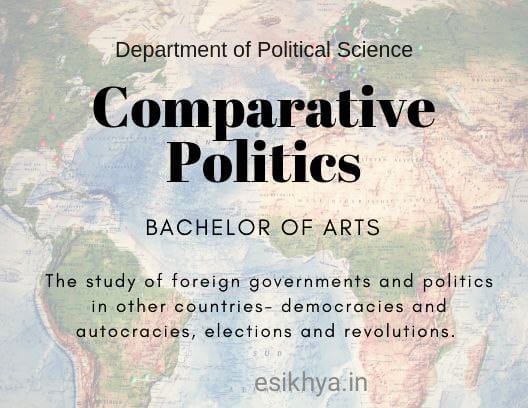
Meaning of Comparative Politics : Comparative Politics is a subfield of political science that involves the systematic study and comparison of political systems, institutions, processes, and behaviors across different countries. It seeks to understand how different political entities function, how power is distributed and exercised, and how various political systems compare and contrast with one another. By examining similarities and differences, scholars can better understand patterns, causes, and effects in political behavior and governance.

Gabriel Almond :
“Comparative politics is concerned with the systematic study of the structures, processes, and functions of political systems in a comparative perspective. It seeks to develop generalizations about political systems, institutions, and behavior through the comparative method.”

Robert Dahl :
“Comparative politics is the study of how political power and authority are organized in different societies and how different political systems work, taking into account their structures, cultures, and histories.”
Nature of Comparative Politics :
- Empirical and Analytical : Comparative Politics relies on empirical observation and data to analyze political systems. It is focused on real-world phenomena rather than theoretical speculation, providing insights based on evidence.
- Cross-national and Cross-regional Comparisons : The core of comparative politics lies in comparing political systems from different countries or regions to understand universal principles, identify trends, or reveal unique patterns.
- Interdisciplinary Approach : Comparative politics often borrows methods and theories from other disciplines like economics, sociology, and history. It examines how various social, economic, and cultural factors influence political behavior and institutions.
- Focus on Institutions and Behavior : Comparative politics looks at both political institutions (like parliaments, executives, and courts) and political behavior (such as voting, protests, and lobbying). It studies how these factors interact to produce different outcomes in various political systems.
- Contextual Study : Political systems are often studied within their unique historical, social, and cultural contexts. Comparative politics seeks to understand how these contexts shape political development and policy-making.
Scope of Comparative Politics :
- Political Institutions : One major area of study in comparative politics is the examination of political institutions across countries. This includes constitutions, electoral systems, legislatures, courts, and executives, and how they shape political processes.
- Political Culture and Socialization : Comparative politics also looks at how citizens’ beliefs, values, and attitudes toward politics differ from country to country. It studies how political culture is formed and the role of political socialization in shaping citizens’ political identities.
- State and Nation-building : The study of the formation and development of states, nation-building processes, and the factors leading to the stability or collapse of states falls under comparative politics.
- Political Economy : Comparative politics often intersects with political economy, exploring how economic systems influence political institutions and vice versa. Topics like democracy, development, and inequality are examined through the lens of both economics and politics.
- Democracy and Authoritarianism : Scholars of comparative politics often study different forms of government and regimes, especially focusing on the differences between democratic and authoritarian systems. They analyze why some countries democratize while others do not and what factors contribute to the rise and fall of authoritarian regimes.
- Conflict, Revolution, and Political Change : Comparative politics also examines political instability, conflict, revolutions, and transitions from one form of government to another. It seeks to understand the causes of political violence, the dynamics of revolutions, and the conditions for political change.
- Public Policy and Governance : The study of public policy processes, including how governments formulate, implement, and evaluate policies, also falls within the scope of comparative politics. Scholars compare the effectiveness of different policy approaches across countries.
Conclusion : Comparative politics provides a rich and broad framework for understanding the political dynamics of different countries. By comparing political systems, institutions, behaviors, and outcomes across various regions and cultures, scholars can uncover patterns, develop theories, and generate practical solutions to political problems faced by countries worldwide. Its interdisciplinary nature makes it a key field for analyzing complex global political phenomena.
